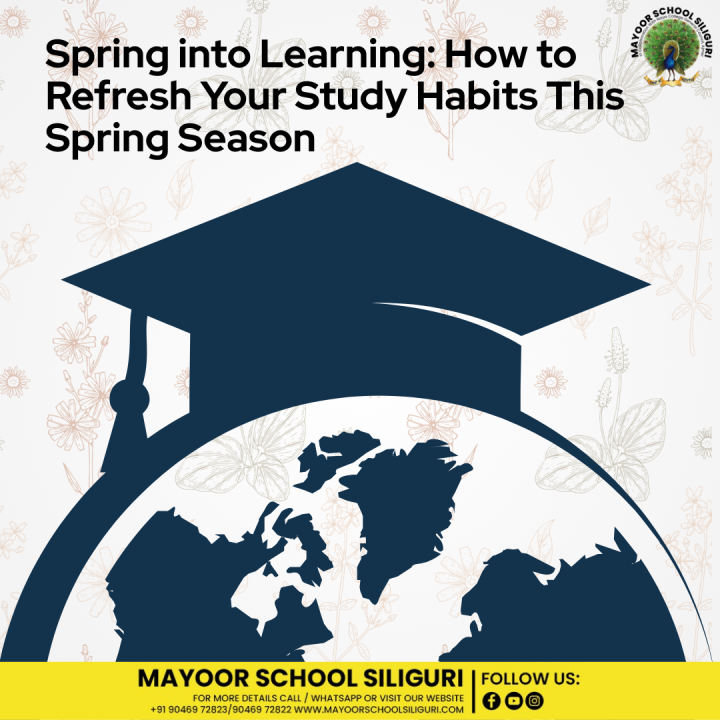
Spring has long been associated with new beginnings. From fresh air to colourful flowers, from new academic year to new clothes, students can relate the rejuvenation of spring. As William Wordsworth once wrote, “The mind that is wise mourns less for what age takes away than what it leaves behind.” This perspective aligns with the psychology of fresh starts, a concept that suggests certain temporal landmarks (such as the start of a new season) provide a motivational boost to initiate new habits. Harnessing this psychological principle can make the study habits more effective and sustainable.
A cluttered space can lead to a cluttered mind. Marie Kondo, in The Life-Changing Magic of Tidying Up, asserts, “The objective of cleaning is not just to clean, but to feel happiness living within that environment.” By decluttering your study space, you create an environment conducive to focus and efficiency. Remove unnecessary materials, organize your books, and perhaps introduce elements of nature, such as plants, to refresh your space and mindset.
Spring provides a perfect backdrop to reassess your academic goals. Instead of vague aspirations like “I want to study more,” adopting the SMART goal framework, Specific, Measurable, Achievable, Relevant, and Time-bound will be effective. James Clear, in Atomic Habits, emphasizes, “You do not rise to the level of your goals. You fall to the level of your systems.” Therefore, establish structured routines that align with your aspirations.
Passively reading textbooks is often ineffective. Instead, adopt active learning techniques, such as:
-The Feynman Technique: Renowned physicist Richard Feynman believed, “If you can’t explain something in simple terms, you don’t understand it well enough.” Teach what you learn to someone else to solidify your comprehension.
-Spaced Repetition: Hermann Ebbinghaus’ Forgetting Curve theory illustrates that reviewing material at intervals enhances memory retention.
-The Pomodoro Technique: Work in focused 25-minute intervals followed by short breaks to maintain productivity and avoid burnout.
Studies show that spending time in nature improves concentration and cognitive function. As Henry David Thoreau wrote in Walden, “I went to the woods because I wished to live deliberately, to face only the essential facts of life.” This spring, consider studying outdoors or incorporating nature walks into your routine to refresh your mind.
Psychologist Carol Dweck, in Mindset: The New Psychology of Success, introduces the concept of a growth mindset, the belief that intelligence and abilities can be developed through dedication and effort. She states, “Becoming is better than being.” Reframe challenges as opportunities to grow rather than barriers to success.
Spring is a great time to reassess your use of technology. While digital tools can enhance learning, excessive screen time and distractions can hinder productivity. Consider:
-Using productivity apps such as Notion, Evernote, or Anki for organizing notes and flashcards.
-Implementing website blockers to minimize distractions from social media.
-Listening to focus-enhancing background music, such as Lo-Fi beats or nature sounds.
A well-rested mind is a productive mind. Sleep researcher Matthew Walker, in Why We Sleep, highlights, “Sleep is the single most effective thing we can do to reset our brain and body health each day.” Ensure you get adequate sleep, stay hydrated, and engage in physical activities to sustain peak cognitive function.
Fueling your brain with the right nutrients can significantly impact cognitive performance. Incorporate brain-boosting foods such as:
-Omega-3 fatty acids (found in fish, walnuts, and flaxseeds) to enhance memory and learning.
-Antioxidant-rich foods (such as berries, dark chocolate, and green tea) to protect brain cells.
-Leafy greens (spinach, kale, and broccoli) to improve cognitive longevity.
-Proper hydration to maintain optimal brain function and prevent fatigue.
Spring is also an excellent opportunity to connect with peers for collaborative learning. Join study groups, participate in discussions, or engage in online forums. Teaching and discussing concepts with others can reinforce understanding and build a supportive academic community.
Spring is an invitation to refresh not only our surroundings but also our learning habits. At Mayoor School Siliguri, recognized as the best school in Siliguri and the best boarding school, we believe in fostering a culture of continuous growth and excellence.
By decluttering your space, setting intentional goals, employing active learning techniques, embracing nature, fostering a growth mindset, and prioritizing rest, you can set yourself up for academic success. As Albert Einstein famously said, “Intellectual growth should commence at birth and cease only at death.”
Let this season be the beginning of a renewed, lifelong commitment to learning. Are you ready to spring into learning? The time for growth is now!
Also Read: Breathe, Bend and Learn: Yoga Benefits for Children